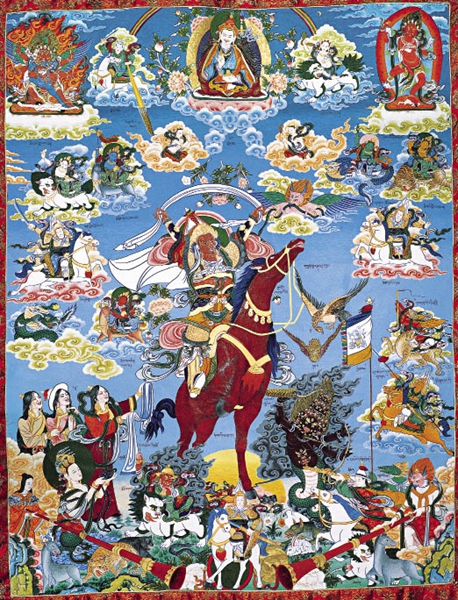King Gesar to Hit the Silver Screen
China Today, November 10, 2016 Adjust font size:
Time Is Ripe
Hegel once said that China had no national epic; Jampel Gyatso’s 30-plus years of study of King Gesar strongly refutes this opinion. The Tibetan epic is actually the longest in the world, longer than The Epic of Gilgamesh, The Iliad, The Odyssey, The Ramayana and The Mahabharat combined. “The study of King Gesar allows China and the world at large to take another look at the people that created it,” said Jampel Gyatso.
China has cultivated a number of King Gesar researchers of both new and older generations and different ethnic groups. What’s more, historical sites and objects related to King Gesar have been afforded better protection, including the Lion and Dragon Palace in Golog Tibetan Autonomous Prefecture in Qinghai Province. A memorial hall and a cultural center dedicated to the legendary hero were built in Dege County and Sertar County of Garze Tibetan Autonomous Prefecture, Sichuan Province respectively, and there is an equestrian park named after the ancient king in Marqu County of Gannan Tibetan Autonomous Prefecture, Gansu Province. In these regions of dense Tibetan populations, King Gesar features prominently in local development strategies and cultural programs.

A Thangka painting of King Gesar out on an expedition.
King Gesar culture reached a new peak after China adopted opening-up and reform policies, as evidenced by the great number of works in the forms of Tibetan Opera, dance dramas, songs, music, and even Peking Opera. “These all provide fodder for the King Gesar film,” said Jampel Gyatso.
Quality First
The film adaptation revolves around three stories chosen from the lengthy epic that are set in contemporary narratives to make them more appealing to today’s audiences. As the life of King Gesar is celebrated for his triumphs over demons and evils, the film is understandably of the fantasy genre. Deyang, however, has pledged that she will not let fantasy gimmicks and special effects overshadow the epic nature of this grand production. “We are not making a fast-food work; quality always comes first,” she declared. “We have the utmost reverence for this figure. Though we are not settled yet on what more we can do for the production, we are clear about what we will never do.”
As to the criticism of the homogenization of Chinese fantasy films, Deyang is confident that King Gesar is the new bonanza for China’s filmmakers to explore after they have almost exhausted resources from such ancient literary classics as Journey to the West and Strange Tales from a Chinese Studio. “King Gesar consists of a good number of stories and characters that construct intricate, dramatic plots and relations. Once this rich mine is exploited, the whole domestic fantasy film sector will be boosted,” said Deyang confidently.
When selecting the actor for the role of King Gesar, Golden Tara General Manager Jiang Hong was impressed that many Buddhist candidates offered to play the role for free. “That’s the power of our legacy.” He acknowledged that the film must be first of all entertaining, as enticing people into the cinema is the most important way to get the story known as widely as possible. To ensure the appeal of an old tale to young people, who constitute the majority of film consumers, Golden Tara will recruit the post-production team behind The Lord of the Rings.
Following the film, the company plans to develop merchandise, including cartoons and computer games. It is even considering a King Gesar-themed cultural park.
The film will be shot in Tibetan areas across China and sites in other countries. It is expected to debut in early 2018 in three languages – Mandarin, Tibetan, and English.
The production team believes it’s their duty to represent this epic, which is widely read and sung among Tibetans, on the big screen to be known by more people. “We will feel nothing but regret if the story of King Gesar is lost among later generations,” said Jiang Hong.